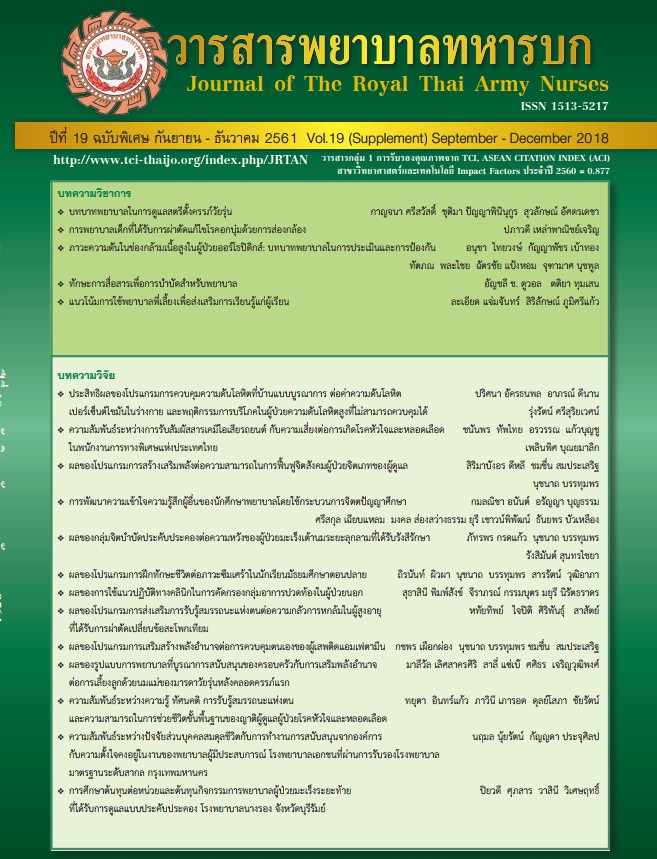Effects of a self-Efficacy Promotion Program and Husbandparticipation on The Repeated Pregnancy Prevention Behaviors Among Adolescent Mothers
Keywords:
adolescent pregnancy, repeated pregnancy, pregnancy prevention, husband participation, self-efficacyAbstract
This quasi-experimental research aimed to study the effects of a self-efficacy promotion program and husband participation on the repeated pregnancy prevention behaviors of adolescent mothers. Fifty-two adolescent mothers aged between 15 and 19 years and their husbands participated in the study. Twenty-six couples were assigned to the experimental group and the rest were assigned to the control group. The experimental group participated in the self-efficacy promotion program with their husbands’ participation, receiving routine postpartum health education, while the participants in the control group received routine postpartum health education. The results showed that the participants in the experimental group had a statistically-higher mean score in preventing repeated pregnancy than the participants in the control group (t = -15.07, p < .05).
Downloads
References
2. Bureau of Reproductive.Reproductive Health Survey. Ministry of Public Health.2016
3. Ajjapol S, Pornvilai C, Ploypayam S, Kamphaeng J. Relationship between self-efficacy and self-care behaviors of adolescent mothers in postpartum period. Journal of Nursing College BoromarajonaniUttaradit.2014;6(1):1-11
4. Uraiwon C. The Effect of Treatment on Infant Babies of Teenage Mothers.ThaiPediatric Journal. 2009;27:369-397.
5. Bandura A. Self-efficacy: The exercise of control. New York: Freeman. 1997
6. Patinya A, Rungrat S, Pornnapa H. Risk Factors of Unintended Repeat Pregnancy among Adolescents. The Public Health Journal of Burapha University. 2013;8 (1):55-67
7. Sunee J, Rungrat S, Pornnapa H. Correlated Factors with Decision Making of Birth Control Implant Used based on the Information-Motivation Behavioral Skills Model (IMB Model) among Teen Mothers. The Journal of Faculty of Nursing Burapha University. 2017; 25(2):31-42.
8. Angsana W, Somjit M. Factors related to the intention to repeat pregnancy among pregnant adolescents. Srinagarind Med J. 2015;30(3): 262-269.
9. Kultida H, Wanna P, Yaowalak S, Dittakarn B. Teaching programme involving husbands’ participation: Its impact on teenage mothers’ post-childbirth maternity adjustment. Thai Journal of Nursing Council. 2012;27(4):84-95.
10. Apasara I, MayureeN, Pregamol R. The Effects of Enhancing Self Efficacy Program on Maternal Role.Nursing Journal. 2014;41(3):48-59.
11. Patinya A, Rungrat S, Pornnapa H. Risk Factors of Unintended Repeat Pregnancy among Adolescents. The Public Health Journal of Burapha University. 2013;8(1):55-67.
12. Suvisa P. Effect of a Self-efficacy Enhancement and Social Support Program on Exercise Behavior Among Pregnant Women. Journal of The Royal Thai Army Nurses.2013;14(2);35-47.
13. Thanyarat J, Mayuree N, Khomsan S. Effects of a promoting self-efficacy program on the oral contraceptive used behavior among adolescent mothers. The Journal of Medical Association of Thailand. 2015; 98(5): 444-450.
Downloads
Published
How to Cite
Issue
Section
License
บทความหรือข้อคิดเห็นใดใดที่ปรากฏในวารสารพยาบาลทหารบกเป็นวรรณกรรมของผู้เขียน ซึ่งบรรณาธิการหรือสมาคมพยาบาลทหารบก ไม่จำเป็นต้องเห็นด้วย
บทความที่ได้รับการตีพิมพ์เป็นลิขสิทธิ์ของวารสารพยาบาลทหารบก
The ideas and opinions expressed in the Journal of The Royal Thai Army Nurses are those of the authors and not necessarily those
of the editor or Royal Thai Army Nurses Association.






